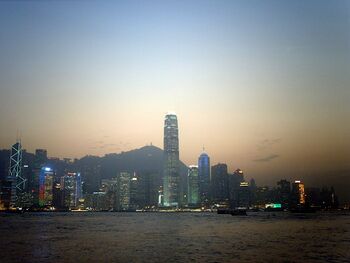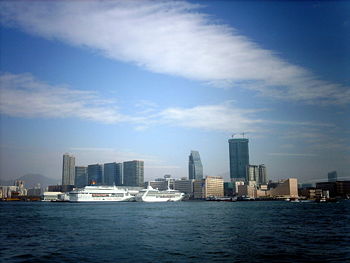Hong Kong: Difference between revisions
imported>Carl Jantzen (Improved opening paragraph) |
imported>Carl Jantzen No edit summary |
||
| Line 5: | Line 5: | ||
[[Image:Hong Kong harbour form Hong Kong Central.JPG|right|thumb|350px|{{#ifexist:Template:Hong Kong harbour form Hong Kong Central.JPG/credit|{{Hong Kong harbour form Hong Kong Central.JPG/credit}}<br/>|}}Hong Kong is a must do stop on any cruse of the east. Several cruse ships lie docked at Hong Kong's Harbour City, a large shopping mall on the Kowloon, mainland, side of Hong Kong harbour.]] | [[Image:Hong Kong harbour form Hong Kong Central.JPG|right|thumb|350px|{{#ifexist:Template:Hong Kong harbour form Hong Kong Central.JPG/credit|{{Hong Kong harbour form Hong Kong Central.JPG/credit}}<br/>|}}Hong Kong is a must do stop on any cruse of the east. Several cruse ships lie docked at Hong Kong's Harbour City, a large shopping mall on the Kowloon, mainland, side of Hong Kong harbour.]] | ||
The island of Hong Kong was taken over from the Chinese, initially by the Dutch, and then by the British, during the 18th Century. The opium wars between Britain and China resulted in Britain obtaining a lease to expand Hong Kong, deeper into the [[New Territories]] of the Kowloon Peninsula. In 1997, at the end of the 100 year lease, the whole of the Hong Kong territory was returned to China. The Chinese instituted a system of "One Country, Two Systems." This created China's first Special Administration Region in Hong Kong. As a result, Hong Kong is highly autonomous with its own government and laws, distinct from that of the rest of the Peoples Republic. Hong Kong maintains its own Immigration and Custom controls and travel between the SAR and the mainland requires the same documentation, checks and procedures as traveling to a foreign country. | The island of Hong Kong was taken over from the Chinese, initially by the Dutch, and then by the British, during the 18th Century. The opium wars between Britain and China resulted in Britain obtaining a lease to expand Hong Kong, deeper into the [[New Territories]] of the Kowloon Peninsula. In 1997, at the end of the 100 year lease, the whole of the Hong Kong territory was returned to China. The Chinese instituted a system of "One Country, Two Systems." This created China's first Special Administration Region in Hong Kong. As a result, Hong Kong is highly autonomous with its own government and laws, distinct from that of the rest of the Peoples Republic. Hong Kong maintains its own Immigration and Custom controls and travel between the SAR and the mainland requires the same documentation, checks and procedures as traveling to a foreign country. | ||
==Name== | |||
Hong Kong literally means "fragrant harbor", and is written in Chinese as 香港. | |||
<!-- # History - When and why was the town founded. Detail major steps in the growth of the town. | <!-- # History - When and why was the town founded. Detail major steps in the growth of the town. | ||
Revision as of 21:51, 20 April 2008
Hong Kong is a a populous city of almost 7 million in Southeast Asia, and a Special Administration Region of China. It is adjacent to Guandong Province of China to the North, and is otherwise surrounded by the South China Sea.
The island of Hong Kong was taken over from the Chinese, initially by the Dutch, and then by the British, during the 18th Century. The opium wars between Britain and China resulted in Britain obtaining a lease to expand Hong Kong, deeper into the New Territories of the Kowloon Peninsula. In 1997, at the end of the 100 year lease, the whole of the Hong Kong territory was returned to China. The Chinese instituted a system of "One Country, Two Systems." This created China's first Special Administration Region in Hong Kong. As a result, Hong Kong is highly autonomous with its own government and laws, distinct from that of the rest of the Peoples Republic. Hong Kong maintains its own Immigration and Custom controls and travel between the SAR and the mainland requires the same documentation, checks and procedures as traveling to a foreign country.
Name
Hong Kong literally means "fragrant harbor", and is written in Chinese as 香港.

